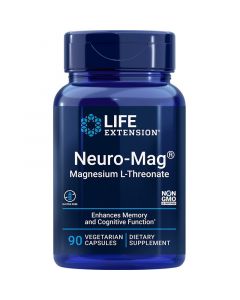
Magnesium Threonate: Benefits, Usage and Side-Effects
Magnesium is an essential mineral involved in over 300 biochemical processes in the body, with a variety of benefits from energy production to muscle, nerve and brain health. Among its many forms, Magnesium threonate stands out for its ability to support brain function and cognitive health. This blog explores what it is, how it’s different and why it is unique.
What is Magnesium Threonate?
Magnesium threonate is magnesium combined with L-threonine, a metabolite of vitamin C. This unique combination makes it highly bioavailable, meaning it passes through the blood-brain barrier delivering magnesium directly to the brain. This makes it particularly effective for improving brain health, focus, memory, and sleep.
Benefits of Magnesium Threonate
Due to its high brain bioavailability, Magnesium Threonate is the go-to supplement for brain-health. Here are some of its benefits:
- Improves Sleep Quality: Magnesium threonate helps relax the nervous system, promoting deeper, more restorative sleep.
- Enhances Cognitive Function: By boosting magnesium levels in the brain, it supports enhanced focus, clarity, and overall mental performance.
- Improves Memory and Learning: Research indicates that Magnesium L-Threonate enhances synaptic plasticity, aiding in better memory retention and learning ability[i].
- Improves Mood and Mental Alertness: By stabilising neural activity, it can reduce stress and anxiety while improving alertness and emotional well-being.
- Supports Brain Health in Aging: Clinical Trials are exploring its use to help overcome age-related issues including those with mild-moderate dementia, by preserving connections between neurons.

How to Use Magnesium Threonate
- Dosage: It is recommended to take around 500 mg to 2,000 mg of magnesium L-threonate, which is about 145 mg of elemental magnesium daily, split into two or three doses.
- Timing: Take with meals for better absorption. Some may take in the evening, or 30-60 minutes before bed, to help relaxation and restorative sleep. Others may prefer morning or afternoon doses, for focus or learning purposes.
- Consistency: Taking magnesium regularly ensures stable magnesium levels in the brain.
- Consult the product label or your healthcare provider for specific instructions.
Recommendations
Magnesium Threonate vs Magnesium Glycinate
Magnesium threonate and magnesium glycinate are both excellent for boosting magnesium levels but have different structures and uses:
- Magnesium Threonate: Magnesium combined with amino acid L-threonine. Great for brain health because it crosses the blood-brain barrier, helping with memory, focus, and sleep.
- Magnesium Glycinate: Magnesium combined with the amino acid glycine. Ideal for overall magnesium support, it helps with anxiety, bone health, muscle and nerve function, and sleep. Read about Magnesium Glycinate here.
It is safe to take both together, but ensure your total magnesium intake stays within recommended limits. Explore our blogs on other types of magnesium including Magnesium Citrate and Magnesium Malate.
Potential Side Effects of Magnesium Threonate
Magnesium threonate is generally safe, but some people may experience mild side effects, including:
- Fatigue
- Nausea
- Stomach upset
- Diarrhoea
Drug Interactions: Magnesium may interfere with medications such as antibiotics or bisphosphonates. To avoid issues, take magnesium at least two hours apart from these medicines.
To minimise risks, stick to the recommended dosage and consult your doctor if you have underlying health conditions or are taking medication.
Summary
Magnesium threonate is a great supplement for improving brain health, sleep, and focus. With consistent use and proper dosing, it can enhance memory and support cognitive function, making it especially beneficial as we age.
FAQ’s
Is it safe to take Magnesium Threonate daily
Yes, Magnesium threonate is safe for daily use when taken within the recommended dosage. Consult a healthcare provider if you have any medical conditions or are taking medications.
How long does it take for Magnesium Threonate to start working?
Effects can often be noticed within a few weeks of consistent use, with more significant benefits appearing after several months.
Should Magnesium Threonate be taken at night or during the day?
It can be taken at any time. Some prefer taking it 30-60 minutes before bed for its sleep-enhancing benefits, but it can be taken any time, depending on your needs
Can you take Magnesium Threonate and Magnesium Glycinate together?
Yes, these supplements can be taken together. Just ensure your total magnesium intake stays within safe limits. Consult a healthcare provider for personalised advice.
Is Magnesium Threonate anti-inflammatory?
Research suggests it may have anti-inflammatory properties, which could support brain health and reduce inflammation-related issues.
Can you take Magnesium with Zinc?
Yes, magnesium and zinc can be taken together. They complement each other, supporting various bodily functions. Stick to recommended dosages to avoid over-supplementation.
Is Magnesium Threonate safe for kidneys?
Magnesium threonate is generally safe for healthy individuals. If you have kidney issues, consult a doctor before use.
What is the best form of Magnesium Threonate?
The patented form, Magtein™, is considered the best option due to its superior absorption and effectiveness in supporting cognitive function.








